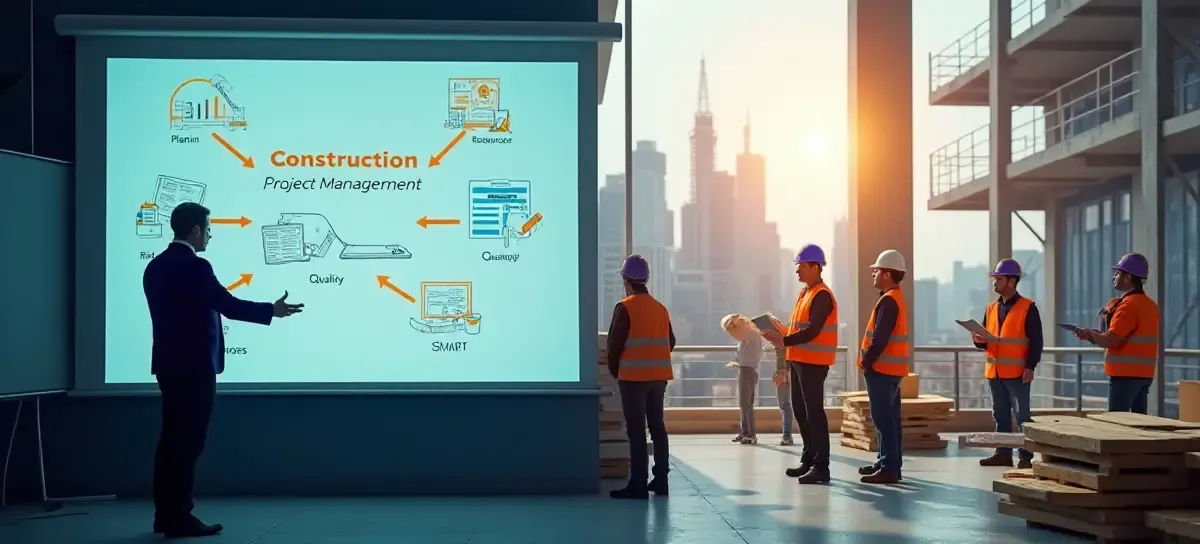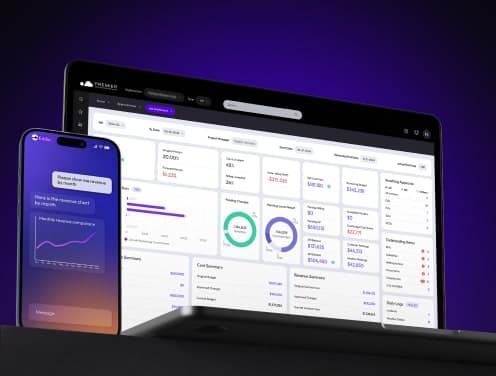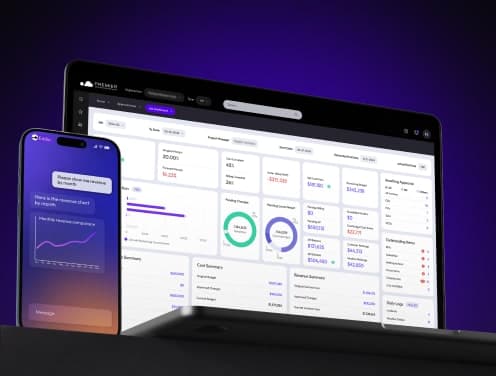
What is Construction Project Management: the Ultimate Guide
The numbers are staggering - 98% of large construction projects go over budget, and projects fall 20 months behind schedule on average.
Construction project management forms the foundation of successful building initiatives. It coordinates countless moving parts from the original planning phase to completion. Experience shows that proper management can determine a project's success or failure, especially with multi-million dollar budgets and tight deadlines.
Digital tools and construction management software have changed the construction industry. Project teams now use modern software to track progress, manage resources, and keep communication channels open. These tech advances make it easier to stay on schedule and within budget.
This piece will help you learn about construction project management - from basic principles to advanced strategies. You'll find practical ways to improve your project management skills, whether you're experienced or just starting in the field.
Understanding Construction Project Management Fundamentals

Let's take a closer look at construction project management by understanding its fundamental building blocks. Construction project management applies processes, methods, and skills to plan, execute, and monitor projects that align with set objectives.
Core Components and Principles
Construction project management centers around five crucial components:
- Project Planning and Definition
- Resource Management and Allocation
- Risk Assessment and Mitigation
- Quality Control and Compliance
- Communication and Documentation
Each component demands careful attention to detail and strategic implementation. Project completion depends on defining SMART objectives: Specific, Measurable, Accepted, Realistic, and Timely.
Key Stakeholders and Their Roles
Construction projects of all sizes involve two main categories of stakeholders - direct and indirect. The key players contribute to project success in these ways:
- Project Owner: Initiates and finances the project, makes high-level decisions
- Construction Manager: Oversees daily operations, manages resources and timeline
- Architects/Engineers: Transform vision into technical specifications
- General Contractors: Execute project plans, manage labor and materials
- Regulatory Bodies: Ensure compliance with codes and regulations
Development of Construction Management
The construction industry has undergone remarkable changes over the last several years. Construction management initially relied on manual labor and paper-based processes, which often caused inefficiencies and delays. Digital technology brought the first major change when software tools for project management and CAD replaced paper-based systems.
The real breakthrough came with the integration of various software tools into unified systems. Modern Enterprise Resource Planning (ERP) solutions now blend all aspects of construction business – from project management and financials to supply chain management and human resources.
These changes show the industry's dedication to breakthroughs and excellence. Today's construction management practices utilize Building Information Modeling, mobile applications, IoT, and cloud-based platforms to improve project efficiency and collaboration.
Essential Skills and Qualifications
Experience with successful construction projects shows that modern construction project managers need a precise blend of technical expertise and interpersonal capabilities. These essential competencies are the foundations of effective construction project management.
Technical Competencies Required
Technical proficiency serves as the life-blood of construction project management. Construction managers must maintain strong industry knowledge. Studies show that 43% of employees report a strong technical foundation brings greater success and job satisfaction. The core technical competencies include:
- Building code knowledge and compliance
- Construction estimating and cost control
- Project scheduling and resource optimization
- Risk assessment and safety protocols
- Technology proficiency and digital tool mastery
Soft Skills for Success
Technical skills are significant, but soft skills often determine a project's success. Communication stands as the most vital soft skill according to industry experts. Construction managers must interact effectively with stakeholders from laborers to property owners.
Leadership helps guide teams to achieve project goals, while problem-solving helps navigate unexpected challenges. Project managers who excel in these areas deliver better results consistently.
Professional Certifications and Training
Professional certifications verify expertise and demonstrate excellence. Here's a comparison of key certifications in construction project management:
- Certified Construction Manager (CCM)
- Gold standard certification, ANSI-accredited
- Highest industry recognition
- Project Management Professional (PMP)
- Cross-industry credential
- 25% higher median salary
- Certified Professional Constructor (CPC)
- Focused on ethical project management
- Strong industry validation
A formal education in construction science, construction management, or related fields provides the foundation. Studies indicate that developing a complete skill set for managing complex projects requires several years of hands-on experience under experienced managers.
Construction industry evolution demands staying current with technological advances. Modern construction project managers must be proficient in construction management software and digital collaboration tools. These technologies help optimize project success.
Digital Transformation in Construction Management
The digital revolution has changed how we manage construction projects. Our team has seen technology adoption become a vital differentiator in project success. Studies show that 96% of construction data goes unused across the industry.
Modern Project Management Tools
Paper-based processes have given way to sophisticated digital solutions. Modern construction management software streamlines operations and boosts productivity with detailed features. Recent data shows construction firms using digital platforms save an average of 15 days on project timelines.
These meaningful features stand out:
- Live project tracking and updates
- Automated scheduling and resource allocation
- Digital document management
- Integrated safety and quality control
- Mobile-first design for field operations
Data Analytics and Reporting
Data analytics has revolutionized our decision-making in construction management. Construction firms that use data analytics see better project outcomes. Teams can monitor project metrics live, and studies show companies can reduce construction rework by 14% through better data management.
Construction analytics platforms now offer:
- Predictive Analysis: Forecast potential issues before they occur
- Cost Tracking: Live budget monitoring and control
- Performance Metrics: Measure and optimize productivity
- Resource Utilization: Track and optimize equipment and labor usage
Cloud-Based Collaboration Platforms
Cloud-based platforms create what we call a "Common Data Environment" (CDE). These platforms have revolutionized team cooperation. Research shows that centralized construction management software cuts communication delays by up to 90%.
Cloud technology in construction has improved project coordination remarkably. Teams can access project information anywhere, and stakeholders always work with the latest document versions. This live accessibility helps maintain project momentum and reduces errors that can get pricey.
Digital transformation in construction management keeps growing as AI and machine learning become common. Companies that use these advanced solutions report better project efficiency. Data shows these digital platforms help contractors compete more effectively on future project bids.
Risk Management and Compliance
Managing risk can determine project success or failure in the construction industry. The construction sector has one of the highest rates of business failure among all economic sectors. Success in construction project management needs a systematic way to handle risk management and compliance.
Identifying and Assessing Project Risks
Risk management in construction starts with a full picture of potential issues. Research shows early risk identification and analysis helps determine if a project is feasible. Construction risks fall into these categories:
- Financial: Cash flow, cost overruns, market conditions
- Safety: Worker accidents, site hazards
- Operational: Schedule delays, equipment failures
- Environmental: Natural disasters, weather conditions
- Legal: Contract disputes, regulatory violations
- Political: Policy changes, civil unrest
Regulatory Compliance Strategies
Both contractors and project owners face major challenges when dealing with construction law complexities. Here's how we handle compliance:
- Understanding federal, state, and local regulations
- Implementing industry best practices
- Maintaining proper documentation
- Conducting regular compliance audits
- Establishing clear communication channels
Recent data reveals the value of construction disputes grew by 42% from 2021 to 2022. This growth shows why reliable compliance strategies matter.
Insurance and Legal Considerations
Our construction project management practice stresses the need for detailed insurance coverage. Construction companies need specific insurance types. Insurance policies must get approval from authorized companies with an A.M. Best rating of A- VIII or better.
Projects must maintain this essential coverage:
- Commercial General Liability (minimum $1,000,000 per occurrence)
- Workers' Compensation (as per state requirements)
- Professional Liability for errors and omissions
- Builder's Risk Insurance for facility improvements
Proper documentation helps reduce risk. We have clear payment processes and use lien waivers to avoid conflicts. We also stay on top of contract management by tracking project progress and using performance bonds to meet deadlines.
Premier’s construction project management software helps us track and manage these risk and compliance elements. This digital solution gives us up-to-the-minute data analysis of potential issues and quick responses to emerging risks.
Sustainable Construction Management Practices
The building and construction industry uses up to 50% of natural resources and adds 39% of CO2 emissions globally. Sustainable practices have become the life-blood of modern construction project management. The industry has changed a lot toward eco-friendly practices.
Green Building Standards
Our work with eco-friendly construction shows that green building certifications like LEED (Leadership in Energy and Environmental Design) have become sought-after standards of excellence. These certifications confirm compliance with strict sustainability standards.
Several key areas need attention:
- Energy Efficiency: 40-50% reduced energy consumption
- Water Conservation: 30% reduced water usage
- Material Selection: Renewable and recycled resources
- Indoor Air Quality: Occupant health and comfort
Environmental Impact Assessment
Environmental Impact Assessment (EIA) is a vital tool in sustainable construction management. This process helps us get the full picture of environmental effects before starting a project. Our assessment looks at:
- Project feasibility and environmental implications
- What it means for local ecosystems
- Regulatory compliance requirements
- Mitigation strategies and alternatives
EIAs can cut project timeline and development costs by a lot. The process needs thorough screening, scoping, and evaluation phases. It ends with an environmental impact statement that guides our decisions.
Resource Optimization Techniques
Our construction projects use various resource optimization strategies that work well. The construction industry creates about 50% of landfill wastes. This makes efficient resource management essential. These key approaches have worked for us:
- Material Management
- Local materials reduce transportation carbon footprint
- Prefabrication techniques in controlled environments
- Recycling concrete and structural steel instead of disposal
- Energy Efficiency
- Dual plumbing systems for potable and reclaimed water
- Passive solar design concepts
- Sustainable insulation materials
Site selection and pollution prevention play a big role in a project's environmental impact. Our construction project management software tracks and improves resource use. This ensures efficient material use and minimal waste.
Water-efficient technologies have shown great results in our sustainable construction projects. We've seen remarkable improvements in project sustainability metrics by using biodegradable materials and focusing on self-powered building designs.
Green building techniques boost property values and lower energy costs. Our comprehensive approach to sustainable construction management has cut environmental impact while keeping high-quality construction standards.
Future Trends and Industry Evolution

The construction project management landscape is changing. New technology and market needs drive this transformation. Construction tech funding reached $5.38 billion in 2022, showing strong faith in the industry's digital future.
Emerging Technologies
Artificial intelligence and machine learning reshape construction project management. Companies using these technologies show impressive results. Digitally advanced firms earn 48% more revenue and achieve 15% higher net margins.
Several key innovations shape our industry as the digital world grows:
- Digital Twins: Better project visualization and monitoring
- AI & Machine Learning: Better decision-making and risk assessment
- Robotics & Automation: Better safety and productivity
- Extended Reality (XR): Better collaboration and design visualization
Digital Twins technology creates virtual copies of physical structures, including assets, systems, and workflows. Our teams can assess, adjust, and optimize buildings before and during construction.
Changing Market Dynamics
Construction industry faces fundamental changes in market dynamics. Research shows 25% of businesses overestimate their data usage skills. 80% of construction businesses remain at beginner or emerging levels of data capabilities. This gap creates new challenges and growth opportunities.
Connected construction sites have become vital to future success. These sites combine various technologies:
- Advanced sensors and IoT devices for immediate monitoring
- Cloud-based collaboration platforms
- Automated resource tracking systems
- Integrated safety monitoring solutions
Companies now use software platforms to boost operations with actionable analytics. This change matters because resource and workforce management remains one of the biggest expenses in construction projects.
Skills for Future Construction Managers
Future construction managers need diverse skills that blend traditional knowledge with digital expertise. Modern construction management needs professionals who can direct both technical and human aspects of project management.
Successful construction managers must master these key skills:
- Digital Proficiency: Using advanced construction management software
- Data Analytics: Understanding and using complex data insights
- Sustainability Leadership: Understanding green building practices and environmental regulations
- Change Management: Leading teams through technical changes
- Remote Team Management: Managing distributed workforces
Data drives the construction industry's future. Research proves that data leaders in construction use AI and machine learning 7 times more often. Our training programs adapt to prepare teams for this digital transformation.
3D printing moves from novelty to industry standard. Construction managers must learn new technical skills while strengthening their leadership abilities. Extended Reality (XR) technologies create more meaningful and efficient work processes.
Connected construction helps companies give their people the power to make informed decisions. Modern construction managers must balance technical knowledge with strategic thinking. They need to use new technologies while focusing on project goals and team leadership.
Conclusion
Construction project management has reached a turning point that combines years of expertise with advanced technology. This piece shows how good management determines if a project soars or stumbles, particularly with today's complex construction challenges.
Our complete analysis brought several insights to light:
- Digital tools and construction management software are the foundations of quick project delivery
- Technical skills paired with strong leadership make successful construction managers
- Risk management and regulatory compliance need systematic, proactive approaches
- Green practices have become crucial, not optional, in today's construction
- AI, digital twins, and automation shape what a world of construction looks like
Today's construction managers should accept new ideas and green practices. They need strong project planning and execution fundamentals. The quickest way to succeed requires mastering digital tools, understanding risk management, and showing steadfast dedication to environmental responsibility.
The field keeps changing because of advanced technology and market needs. Teams that adapt fast and stay focused on both optimization and sustainability will push the industry forward. They build structures that work for people today and tomorrow.





















